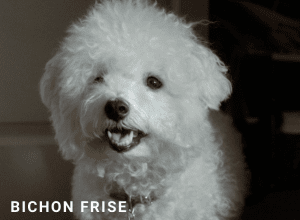
Bichon Frise Dog Insurance Review
Dog Group Toy
We have carried out detailed analysis to find the best dog insurance for a Bichon Frise. We have researched the breeds history, health, personality and temperament, all areas that may be important when searching for the best pet Insurance for your Bichon Frise.
Overview
The Toy Breed Group
Bichon Frises love their people as one would expect from a companion dog, but true to their heritage, will bark at strange sounds and intruders. It’s important to tone down their yappyiness and train them, when, and when not to bark. They are affectionate, playful, and courageous and think they are larger than they actually are. Larger dogs beware.
Bichon Frises are intelligent dogs with a happy, loving personality. Because of this, they can be good for first time owners who want a small breed of dog and are able to be with them most of the time, as they don’t like being home alone.
History of your Bichon Frise
It is thought the Bichon Frise was created in the Mediterranean part of Europe and bought back with Sailors from Tenerife. They were traded for goods in the 14 century, and were popular in Spanish and Italian courts in the 14th and 15th centuries. They became popular in France when Francis I was on the throne, and at the time of Henry III, and was in many paintings. By the end of 1800’s, Bichons were used to accompany organ grinders and circuses as performing dogs, because they were quick to learn new tricks. After WW1 there was new interest in the breed and with careful selection, new breeding lines were established in 1933.
A TV programme in Australia in 1960 made the breed popular with a Bichon called Molly. They remain one of the most popular breeds today
http://www.thekennelclub.org.uk/services/public/breed/watch for more information
Size of your Bichon Frise
The Bichon Frise are small sized dogs. Males generally reach a height of 23-30 CM and weigh around 3-5 Kg. Females are normally a bit smaller. Height 23-28 CM and weigh around 3-5 Kg
Health of your Bichon Frise
As a purebred dog it is usually long lived, but as with similar dogs may encounter breed related health issues.
Some health problems are possible but not all Bichon Frises will get any, or all these diseases, but it’s important to be aware of them if you’re considering this breed.
Hereditary cataracts – tests available
Patella luxation
Immune Mediated Thrombocytopenia (ITP)
Autoimmune Haemolytic Anaemia (AIHA)
Heart disease: artery fails to close, resulting in a heart murmur
Portosystemic shunt
Immune mediated haemolytic anaemia
You can minimise any health problems by making sure your dog comes from a registered breeder and that you see the puppy with its mother before you buy. Check the premises / home. These dogs are popular and can sell for £610 if KC registered and £510 if not registered.
There are irresponsible breeders running puppy farms, so it is important to check where your puppy comes from. They can charge £2000- £3000 currently for a puppy.
www.thekennelclub.org.uk for more information

PERSONALITY AND TEMPERAMENT OF YOUR BICHON FRISE
Bichon Frises learn quickly if motivated. To keep their attention, keep training sessions short and fun, as they will become bored if made to repeat the same thing too many times. They can be difficult to house train so you will need to be patient. Crate training may help. For more information https://www.preventivevet.com/dogs/crate-training-at-night-for-puppies
They are a small affectionate breed and as they are people dogs, they don’t like to be left alone. Not a good dog if out working all day, and can be noisy, and have a big bark for a small dog. This makes them good watchdogs but something to consider if living in an apartment. They are clever, lively, and courageous and have a reputation for being entertaining and fearless, but what they want most is to cuddle with their family. They love to come on the sofa or bed for a cuddle, a good family pet.
A Toy Breed of dog suitable for apartments and houses with small gardens, but happy in a town or country environment. Does not like to be alone, but as it is small, likely to be welcome in many places. Can be yappy if stressed. Barking may become a problem if not trained correctly.
Grooming and care of your Bichon Frise
They need at about 30 mins a day exercise (two at 15 minutes) and will also be happy with play at home sometimes if you are short of time or working from home. Bichon Frises have a soft coat with corkscrew curls that should be brushed every day to prevent mats from forming, especially around their elbows and ears. The typical coat has also been listed by many popular dog information websites, as being hypoallergenic. But this questioned by some experts in allergies. In comparison with many other breeds, Bichon Frises do not usually shed to the same amount of hair as some other breeds
If asthmatic or you have an allergy, it’s sensible to check that this dog is suitable for your household. More information can be found on the www.thekennelclub.org.uk.
Feeding your Bichon Frise
There are many suitable brands of dog feed on the market, most supply feeding guides. The first item on the ingredients list will tell you how much of the main ingredient is in the food e.g. Chicken, beef salmon etc. Your vet will advise if a special diet is needed. There are some foods that you should never give to any dog for example Chocolate, grapes, sultanas, onions for a full list look on www.thekennelclub.org.uk
The Bichon Frise with other pets
They get on with other pets if introduced when young, and even though they are small, they will play with other dogs in the family. They don’t like to be alone so many owners have two dogs.
The Bichon Frise with Children
If raised with children and socialised from a young age they will be happy with children in its own family. Playtime should be supervised as because they are small, they can be hurt by over boisterous children.
Having a gentle, affectionate, and playful nature most problems arise from poor socialisation and boredom, so include children in a training regime. Teach your child never to approach any dog while he’s sleeping or eating or to try to take the dog’s food away. This is common sense that should apply to all dogs.
Important: Always make sure you go and visit the breeder of the puppy you are buying. Never send money for a deposit/full payment in advance of meeting them. To find out what to look for when buying a puppy see advice here https://www.thekennelclub.org.uk/getting-a-dog-or-puppy/buying-a-dog/
When choosing dog insurance for your dog, pay special attention to the age at which an Insurer will either no longer quote or require an additional payment when it comes to settling any claim Check the reviews, rating and comparison on the Pet insurance page of thatsinsurance
Views: 1989 | Comments: 0